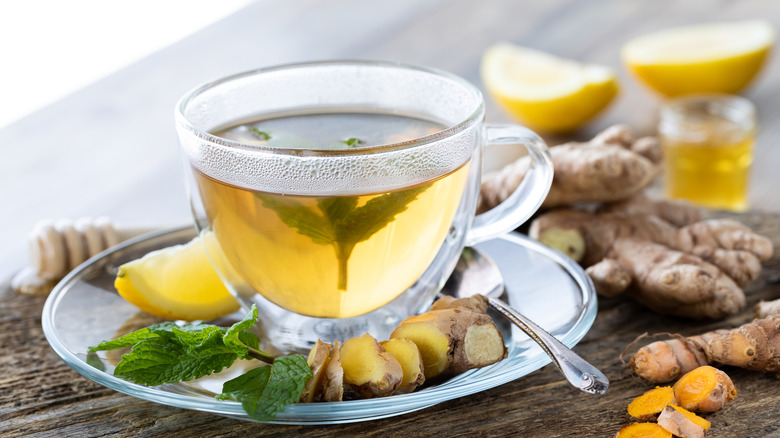Is Green Tea A Good Treatment For Rheumatoid Arthritis?
Rheumatoid arthritis (RA) is a lifelong condition that affects nearly every system in your body. Like other autoimmune disorders, it occurs when the immune system goes into overdrive and begins to attack healthy tissues, explains the Centers for Disease Control and Prevention (CDC). Its primary symptoms include joint pain and inflammation, but you may also experience fatigue, unintentional weight loss, or weakness. About 40% of patients develop problems affecting their skin, heart, kidneys, nerves, eyes, and blood vessels, reports the Mayo Clinic. In some cases, this disorder can affect the lungs and bone marrow.
Most people living with rheumatoid arthritis experience flare-ups followed by periods of remission. The disease is not curable, but proper treatment can slow its progression and help you stay in remission for longer periods. Depending on your symptoms, doctors may prescribe disease-modifying antirheumatic drugs (DMARDs), biologic agents, painkillers, or corticosteroids. Unfortunately, these medications can have serious side effects ranging from weight gain and bone loss to liver damage, warns the Cleveland Clinic.
Lifestyle changes can make a world of difference, but you'll still need to take your meds. Regular exercise, for instance, can boost your mood and energy, alleviate pain, and improve joint range of motion, says the CDC. What you eat and drink matters, too. Green tea is particularly beneficial due to its antioxidant and anti-inflammatory effects, notes the Arthritis Foundation. Some studies even suggest that it may prevent bone loss, but more research is needed to confirm it.
Green tea may ease joint pain and inflammation
You might have heard that green tea protects against diabetes, obesity, heart disease, and other conditions. These potential benefits are due to its content of polyphenols, especially epigallocatechin-3-gallate (EGCG), according to a 2010 review published in the journal Chinese Medicine. What you may not know is that green tea consumption may also help with arthritis pain and inflammation.
In one study, EGCG decreased the levels of TAK1, a protein responsible for tissue damage and inflammation in people with rheumatoid arthritis. The research was conducted on rats, but scientists believe that EGCG may benefit humans, too, reports the journal Arthritis and Rheumatology. What's more, this compound is safer than pharmaceutical drugs and has a unique mechanism of action.
In another study, RA patients who engaged in regular exercise and consumed four to six cups of green tea per day for six months experienced noticeable improvements in joint pain and inflammation, according to the Journal of Physical Therapy Science. As the researchers note, green tea polyphenols may also help maintain bone mineral density and cartilage integrity while preventing collagen degradation.
This natural beverage isn't a miracle cure, but it may ease your symptoms and keep them from getting worse. Plus, it supports immune function and may protect against infections, a common side effect of corticosteroids and other RA drugs, says the Arthritis Foundation. So, go ahead and drink a cup of tea — it might be just what you need to start feeling better.


